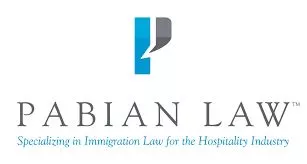- within Immigration topic(s)
- in United States
- within Immigration topic(s)
- with readers working within the Construction & Engineering industries
I hope all is well. On October 29th, the U.S. Department of Homeland Security (DHS) announced in an interim final rule that it is ending the practice of automatically extending Employment Authorization Documents (EADs) for certain foreign nationals. See DHS Ends Automatic Extension of Employment Authorization | USCIS Foreign nationals filing EAD renewal applications in certain employment authorization categories on or after Oct. 30, 2025 will no longer receive an automatic extension of their EAD.
Excitingly, Pabian Law now has a wonderful team that assists employers with Employment Verification issues (I-9, E-Verify, expiring Employment Authorization Cards (EADs), and more). Please do not hesitate to reach out if we can be of assistance with these types of matters.
What the Rule Means
Before the new rule, it was possible to file a timely EAD extension application and have the EAD validity period be automatically extended for up to 540 days while the extension was pending. For employers, this meant that the employee's form I-9 could be temporarily re-verified using the EAD renewal receipt notice, and then re-verified again when the renewed EAD itself was issued.
Now, if the EAD renewal application is not approved by the time the current EAD expires, the foreign national will not be able to work until the renewal is approved and the new EAD card is received. In most cases, a Receipt Notice for a pending EAD renewal application that was filed on or after October 30, 2025 can no longer be used to re-verify the form I-9. This will mean that foreign national workers will need to stop working while the EAD renewal application is pending unless the employee can present other valid I-9 verification documents proving employment authorization.
EAD Categories Impacted
Below are some of the most common EAD categories (found on the EAD card) that are impacted by the rule:
- Refugees (A3 category);
- Asylees (A5 category);
- Individuals with pending asylum applications (C8 category);
- Individuals with pending I-485 green card applications (C9 category);
- Individuals with suspension of deportation applications (C10 category);
- Individuals in H-4 status who are eligible for EAD's (C26 category).
Individuals in L-2 and E-3 dependent status are also impacted; however, they do not always need an EAD to evidence employment authorization.
For a full list of impacted categories see Automatic Employment Authorization Document (EAD) Extension | USCIS
Who is Not Impacted
The rule does not impact the validity of eligible EAD extension applications that were filed before October 30, 2025, as those EADs remain automatically extended for up to 540 days.
The rule also does not apply to EADs that are considered automatically extended through a Federal Register notice (this applies to TPS-related EADs such as in the A12 or C19 categories).
The rule also does not impact students in F-1 visa status. Student EADs are still eligible for automatic renewals of up to 180 days while the renewal application is pending.
Also not impacted are foreign nationals who have pending applications for extension of other statuses, such as H-2B, H-1B, L-1, O-1, P-1, TN, or E-2 visas. These individuals are still covered by an automatic 240-day extension while their status renewal is pending.
Tips for Employers
If you find that one of your employees is affected by the above, you should reach out to the employee and let them know that you will need to reverify their employment authorization status. We recommend sending reminders to employees six (6) months in advance of the I-9 re-verification date in order to provide them with an opportunity to file any necessary paperwork in advance of their status expiration.
If you have an employee whose EAD has already expired and that person presents you with an EAD renewal Receipt Notice, you should notify them that the automatic EAD renewal is no longer in effect and they cannot use the Receipt Notice to work. In this scenario, they will not be able to work unless they have alternative employment authorization or until the EAD renewal application is approved.
Tips for Foreign Nationals with Impacted EADs
We strongly recommend that foreign national workers file EAD renewal applications as soon as possible. Many EAD renewal applications cannot be submitted until a person is within 6 months of the EAD expiration date. It is best practice to file the renewal application right at the 6-month mark. Most EAD renewal applications are processed in 3-8 months. However, even when filing 6 months prior to an EAD expiration, it is possible that an interruption in work authorization may occur if the case processing goes past the 6-month mark.
As always, please do not hesitate to reach out with any questions or concerns.
Thank you,
The content of this article is intended to provide a general guide to the subject matter. Specialist advice should be sought about your specific circumstances.


